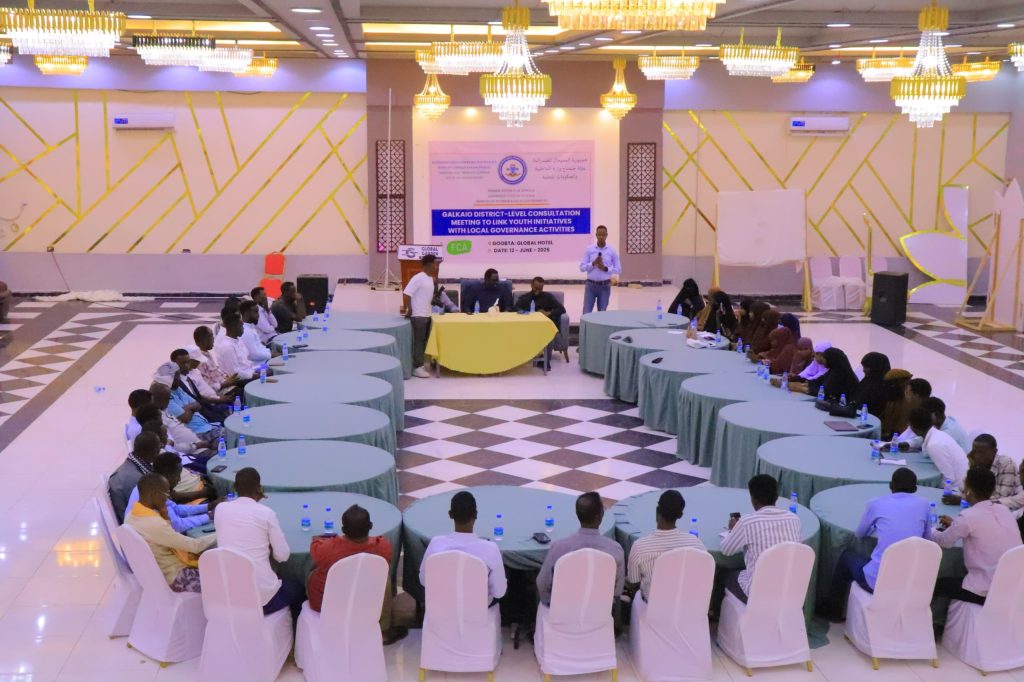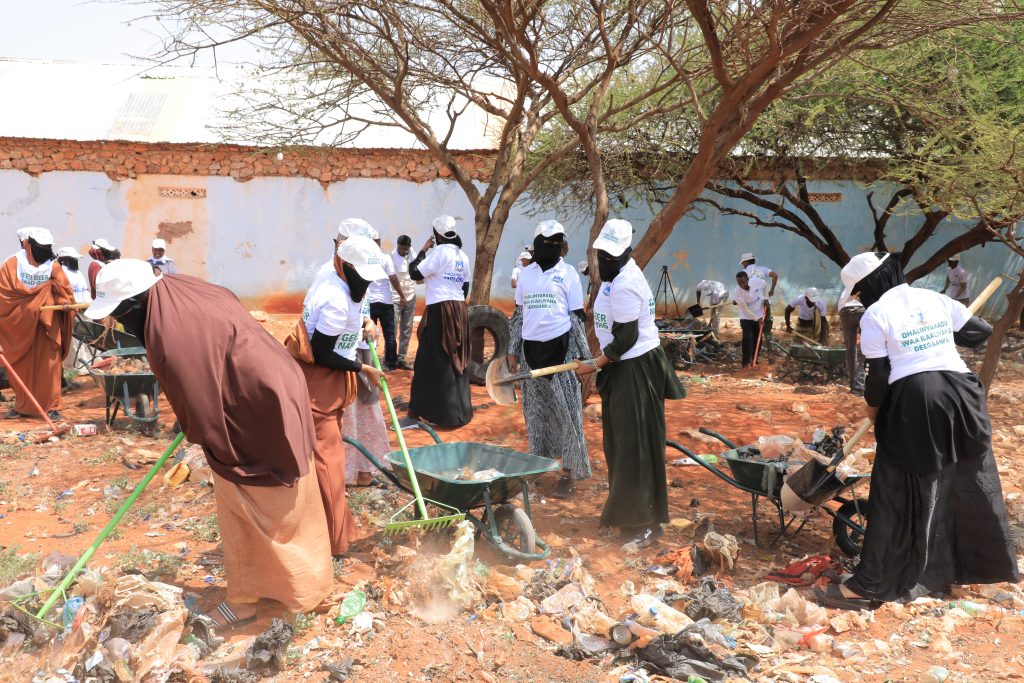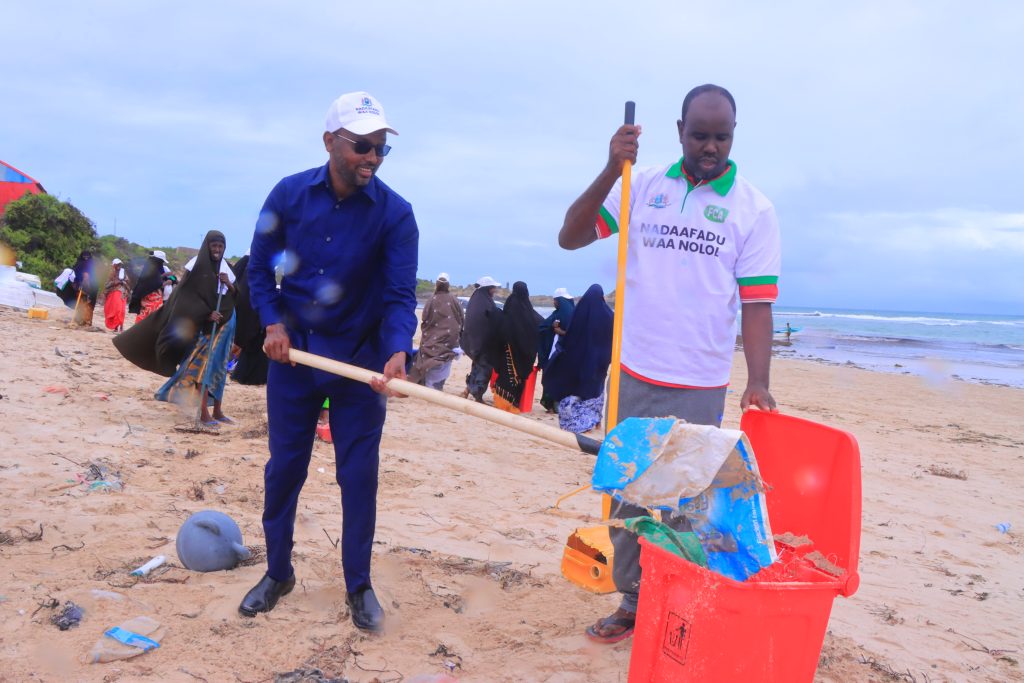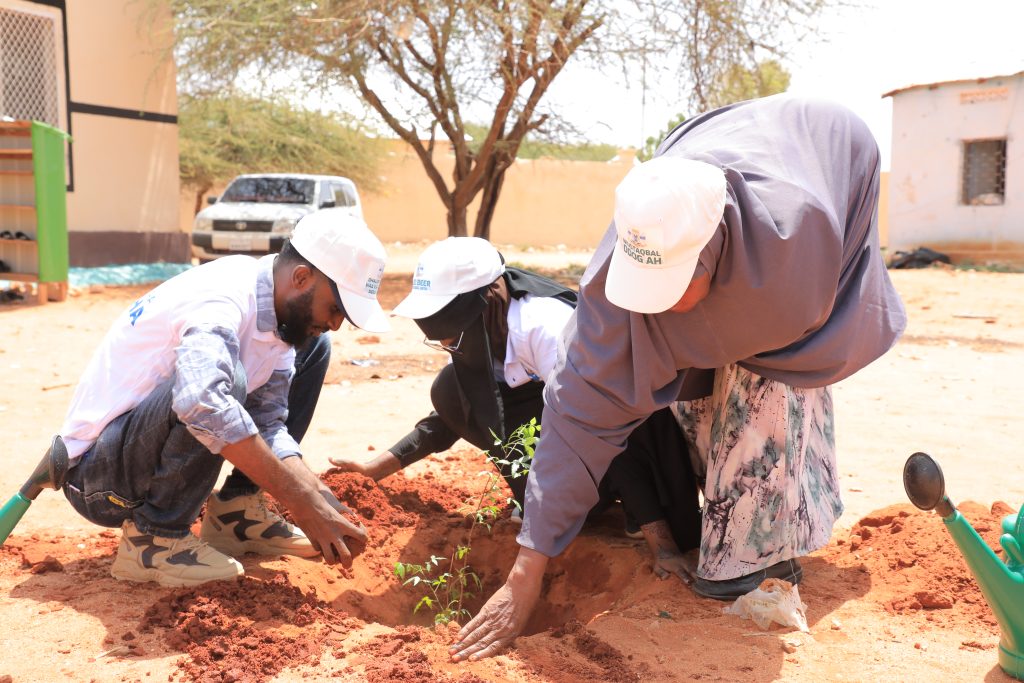From learners to leaders: Somali youth are taking environmental initiatives
In Galkayo, Abudwak, and Warsheikh, Somali youth transitioned from disengaged bystanders to active civic and environmental leaders after participating in a civic education and environmental stewardship initiative supported by the Somalia Stability Fund III (SSF) and implemented by Finn Church Aid (FCA).
Across Galmudug and Hirshabelle, youth have historically faced limited opportunities for meaningful civic engagement. Despite being well-educated and eager to contribute, they were often excluded from local governance processes. This disconnect has contributed to feelings of marginalization among youth and women, weakening the social cohesion and slowing development progress.
To address this, FCA, with support from the Somalia Stability Fund III (SSF III), launched the Youth Civic Education and Environmental Stewardship Initiative in June 2025 in partnership with the Ministries of Interior in Galmudug and Hirshabelle. The initiative aimed to equip youth with civic knowledge, promote environmental stewardship, and foster collaborative relationships between young people and district administrations.
Who was impacted?
Youth gained civic knowledge, leadership skills, and access to platforms that legitimized their voices and stewardship in community development.
District officials began recognizing youth as partners in development and adjusted their approaches accordingly.
Local communities benefited from the visible outcomes of youth-led initiatives, such as cleaner public spaces, increased environmental awareness, and stronger social cohesion.
Women’s groups leveraged the opportunity to use these new platforms to advance gender-inclusive approaches to environmental action and governance, reinforcing their critical role in both community resilience and decision-making.
Over 80 youth from Galkayo, Abudwak, Jowhar and Warsheikh received intensive training on constitutional rights, civic responsibility, climate resilience, and community mobilization. However, the most transformative outcomes occurred not in the training rooms, but when participants applied their knowledge through community-led actions. Through public clean-ups and facilitating consultations with local authorities, Somali youth have begun reshaping both their physical environment and governance landscape.
Galkayo: Amplifying youth voices in governance
In early June, 20 young men and women from schools, universities and youth-led organizations participated in a five-day civic training facilitated by the Galmudug Ministry of Interior and supported by FCA. The sessions focused on constitutional literacy, civic duties, climate resilience, and community mobilization.
“I never read the Somali provisional constitution, nor did I understand my constitutional rights and responsibilities. Thanks to the training, now I read a few chapters as part of the training exercise, and I intend to continue to finish before the training finishes,” said Abdikadir, one of the participants, after reading Somalia’s Constitution for the first time.
Pre- and post-assessments showed an increased civic knowledge in the participants from 30% to 95%. The impact extended further when participants attended a district consultation meeting with the Deputy Mayor and local officials. They presented actionable recommendations, highlighted exclusion and unemployment, and advocated for youth inclusion in district development processes.

“Many of us are educated and working to support community development, yet the administration sees us as problems rather than partners. We’re on the same mission — to uplift Galkayo — so we should be working together. There are areas beyond their reach where we can step in and help,” said Nasteho, who also participated in the training.
After the training, Galkayo local authorities promised that youth in the district would be involved in the district’s development efforts henceforth. What began as training became a partnership between youth and governance, marking a shift from training to tangible policy engagement — a significant change.
Abudwak: From training rooms to tree planting
In Abudwak, Galmudug State, 20 young men and women completed a four-day intensive training program on governance, civic rights, environmental responsibility, and climate change. The program did not end with the sessions; the youth translated their learning into action.

With support from FCA and SSF, the youth organized a peer-led environmental campaign that mobilized over 60 residents. Over three days, teams cleaned public spaces including the police station, district hospital, the women’s center (Guriga Hooyooyinka), and a local orphanage. They planted and fenced 80 trees as a symbolic and practical contribution to environmental resilience.
“Today, the city has been awakened,” said Ifrah, a training participant in Abudwak.
“We can see what happens when youth are involved. We urge the government to build on the knowledge we’ve gained through this training by meaningfully including youth in local development and decision-making processes.”
“This is not just about cleaning,” said Farah, a youth member. “We’re saying: we are here. We care. And we want to be part of the solution.”

During a district consultation attended by youth groups and community leaders, the district Mayor and Galmudug’s Minister of Interior acknowledged the youth’s leadership.
“You should never be guests in decisions that affect your lives,” said H.E. Abdi Mohamed Jama, Galmudug Minister of Interior.
“You are not just participants—you are the leaders. You have a duty to protect your environment, claim your rights, and lead this country toward a better future.”
The initiative demonstrated that practical civic education, when paired with community action, can reposition youth as credible development partners.
Warsheikh: Youth and Women at the Frontlines of Environmental Action
In the coastal town of Warsheikh, youth adapted their training to local challenges. They led an environmental campaign across four villages, Sh. Cabdi, Iftin, Beder, and Umulkheyr, raising awareness through door-to-door outreach, beach cleanups, and temporary waste collection points. They also facilitated community dialogues to integrate traditional environmental practices.
“The youth are ready. What we need is a belief and inclusion,” said Abdullahi Awes Mohamed, a representative of the Warsheikh youth network.

Women were also at the forefront. Qali Mire Sahal, Chairlady of the Women’s Network, spoke passionately about the dual burden and strength of women in environmental stewardship.
“We’re the ones keeping our homes and streets clean. We plant, we teach — but we’re still left behind from the decisions and efforts. That would hopefully change after this exercise, where we demonstrated our contributions and energy.”
And it is changing. In a landmark consultation on June 16, the District Commissioner of Warsheikh, Mr. Mohamed Hassan Mantaan, announced plans to establish a Youth-Government Liaison Committee and pledged that youth-led initiatives would be included in the district’s future planning.
“These programs didn’t just build capacity — they built trust,” he said. “Our youth are now part of our governance processes.”
Beyond campaigns: Building a culture of civic engagement
While outcomes such as tree planting and waste clean-up are measurable, the most significant shift was cultural. Youth transitioned from passive recipients to active agents of change. Youth stood before local officials to demand inclusion in district planning and were taken seriously.
This transformation, from exclusion to inclusion, from training to trust, reflects the core objective of SSF III: to support locally owned, inclusive governance.

Toward long-term impact
These changes are setting the foundation for systemic, sustainable engagement. Districts are now considering establishing youth advisory boards. Environmental actions are being institutionalized into local governance. Civic engagement is moving from a one-time event to a sustained practice. SSF III continues to support this momentum through mentoring, provision of tools and materials, and by scaling peer-to-peer engagement models to expand reach.
Planting the future
In Abudwak, Warsheikh, Jowhar, and Galkayo, youth are no longer passive or peripheral. They are initiating change, shaping discourse, and leading community development efforts.
These actions began with workshops, but they’re growing into a movement. In a country that is often defined by instability, these young people are planting the seeds of resilience, rooted in action, voice, and agency. They are not future leaders. They are leading now.